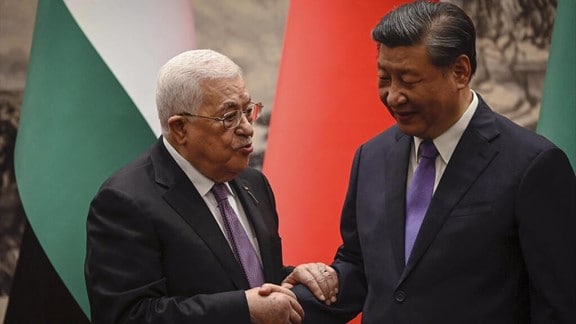From the vantage point of the Middle East, it appears that the West's "unipolar moment" has ended. The United States has concentrated all its efforts in financially and militarily supporting Ukraine against Russia, yet it has been neglecting other regions in the world – first and foremost the Middle East. The U.S. has been absent in the region and, as a result, its historic and strategic allies in the Gulf – such as Saudi Arabia and the UAE – have begun to look for other countries willing to support their interests.
China, which longs to become the top global superpower, could not have hoped for a better opportunity. Taking advantage of the vacuum left by the U.S., Beijing mediated the normalization of relations between the two most important countries in the region: Iran and Saudi Arabia.[1] After all, Washington has abandoned the Saudis in their proxy war with Tehran (indeed, President Joe Biden vowed to make Saudi Arabia a pariah state in light of the assassination of journalist Jamal Khashoggi), so they have decided to follow the adage: "If you can't beat 'em, join 'em."

Chinese President Xi Jinping – China longs to become the top global superpower (Photo: AFP)
The Saudis' diplomatic decision has proved to be rewarding. Iran has stopped the Houthi attacks on Gulf Cooperation Council countries, and the U.S. was forced to acknowledge Saudi Arabia's strategic importance, giving it the green light to develop a civilian nuclear program in exchange for its support in nuclear negotiations with Iran. This was driven partly by the fear that its old ally would turn its back on the West for good and instead turn to the East.
America's support for the Saudis is better late than never – but it is nonetheless too late. Saudi Arabia has already diversified its alliances, since it felt that it could not rely only on the United States. Furthermore, after the disastrous Afghanistan withdrawal, the U.S. has been losing ground in Iraq, which is today a de-facto Iranian colony. America's recent naval and ground reinforcements in Syria and the Persian Gulf will not change this fact.
Meanwhile, China continues to strengthen its political and economic role in the region. China's ambassador to Tehran, Chang Hua, recently emphasized that Chinese-Iranian cooperation is at its height. Indeed, according to the data intelligence firm Kpler, Iran's sanctioned oil shipments to China have tripled over the past three years, and its oil sector is experiencing noticeable growth. Saudi Arabia's state-owned oil company, Aramco, is also investing billions of dollars in China's petrochemical industry.
SUPPORT OUR WORK


Prime Minister Benjamin Netanyahu and Chinese President Xi Jinping – even Bibi has a visit to China planned (Photo: Getty Images)
Even Israeli Prime Minister Benjamin Netanyahu has a visit to Beijing planned.[2] Notably, this is at a complex time for Israel – massive demonstrations against Netanyahu's government and policies have been taking place weekly throughout the country, and the Palestinian Authority increasingly fears a coup in the West Bank by Hamas, the Palestinian Islamic Jihad and other terror groups. As the U.S. seems more and more powerless when it comes to dealing with the decades-long Israeli-Palestinian conflict, China would be happy to replace it as the new mediator (along with Qatar and Egypt).[3]
For Israel, China is also valuable as a channel to dialogue with Russia. The U.S. pressured Israel to sell to Germany its Arrow missile defense system, which will likely end up in Ukraine. This will not be taken lightly by the Russians, who are operating in Israel's neighbor, Syria. For years, there has been tacit agreement between the two countries that allowed Israel to target Iran-backed militias in Syria, but this could deteriorate if Israel's Arrow system ends up in Ukraine. This is why Israel might also have an interest in "diversifying" its global alliances in order to protect its national interests.
China is enjoying this time that the U.S. is preoccupied with Ukraine. In accordance with Lao Tzu's teachings, Beijing wants the current conflict to continue, since it is consuming America's energy and gives the CCP time to strengthen its position relative to Washington.

Palestinian Authority President Mahmoud Abbas and Chinese President Xi Jinping – China would love to mediate the Palestinian-Israeli conflict (Photo: AP)
The same can be said for Russia. The Ukraine conflict has given Moscow a unique opportunity to lead the fight against "neocolonialism" and "imperialism" in the African continent and elsewhere, as it had done during the days of the Soviet Union. The recent coup in Niger demonstrates that Russia has been successful in repositioning itself in this role, since despite America's push for intervention by the Economic Community of West African States (ECOWAS) against the military junta, the majority of African countries oppose starting a war. For now, despite the Western sanctions and the war in Ukraine, Russia has been keeping its head above water, largely thanks to state-backed loans, subsidies and oil and gas sales to China.
If the West's idea to engage in Ukraine's war against Russia was to consolidate the "end of history," Fukuyama's idea that predicted that liberal democracy would prevail as a permanent order, it achieved quite the opposite. With the U.S. basically absent globally, new powers have emerged. These powers do not yet have the influence that the U.S. has, but they are nonetheless rising steadily as America's dominance is in decline. As a consequence, the 2024 U.S. presidential election will be decisive in determining whether American exceptionalism will survive, as it hopefully will, or whether it will totally collapse and give way to the "multipolar" world order that China and Russia have been working toward for years.
*Anna Mahjar-Barducci is a MEMRI Senior Research Fellow





